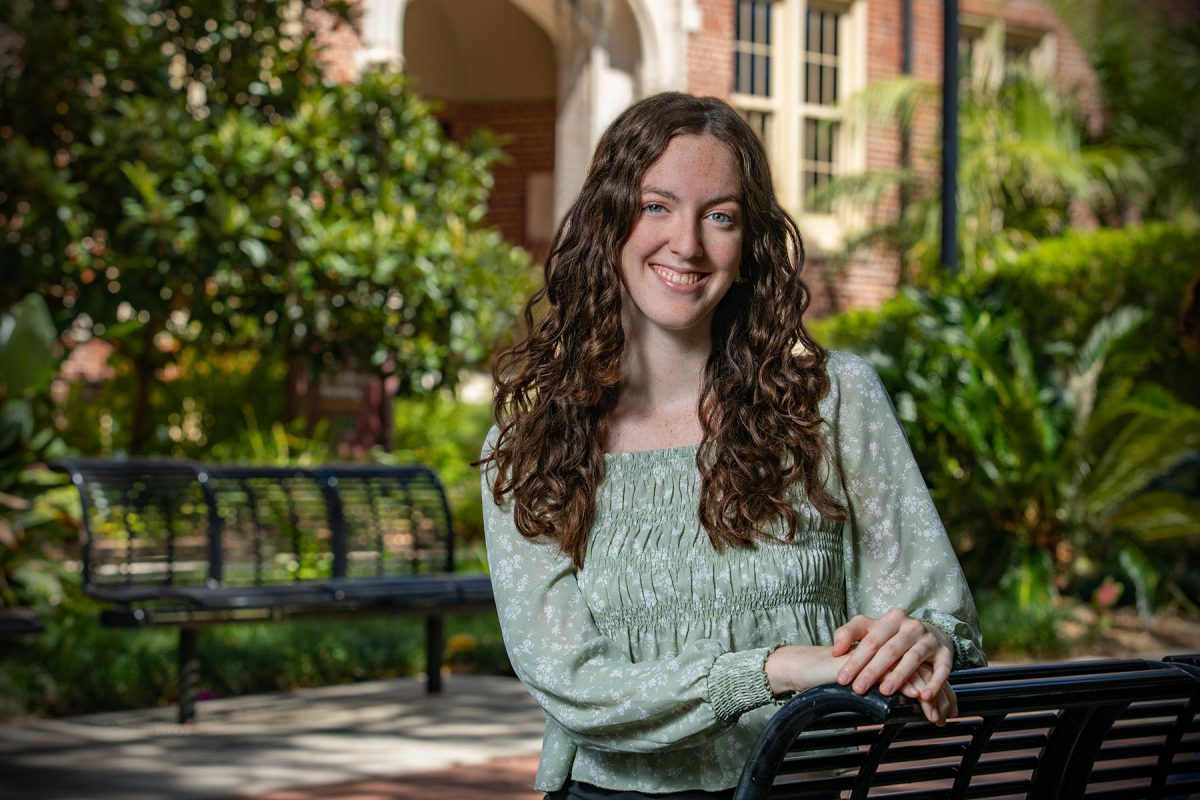
“The diversity and experience Florida State has provided me has truly allowed me to thrive in both of my passions.”
Fast Facts
- Favorite Campus Spot: Ruby Diamond Concert Hall
- Academics: Has been on the Dean’s or President’s lists every year
- Music: Started playing the cello at age 6
- Animal lover: Has a 20-lb. Maine Coon cat named Spike
With a lifelong love for playing the cello, Katie Jo Gelasco felt that settling for a mediocre music program was not an option. After a successful audition at the College of Music, Gelasco put Florida State University on her radar. However, it wasn’t until she learned about FSU’s science and research programs that she decided to attend.
Gelasco has taken advantage of FSU’s dual degree program to pursue both passions, which, as opposing as they seem, contribute to her success in each respective field.
“Just like the saying that it’s ‘exercising both parts of the brain,’ music keeps me from burning out during my science studies and being in the lab allows me to explore the inquisitive side of being in STEM,” Gelasco said.
Last year, Gelasco became one of the youngest members of the majority graduate-level ensemble for the University Symphony Orchestra and participated in their first international tour, which ended in Santo Domingo, Dominican Republic.
During one of the performances, FSU students played side-by-side with a local youth orchestra based in Santo Domingo, using music as a nonverbal tool to communicate and express themselves.
“To be able to expose people to incredible music and inspire youth to continue to play no matter their circumstances reminds me that art is essential to every community,” Gelasco said.
When she’s not on an international tour, Gelasco conducts research in the Lab of Hong Li, professor of chemistry and biochemistry, where she engineers CRISPR-Cas9 proteins, which are used to remove, add or alter sections of a DNA sequence. Through her Phi Eta Sigma Undergraduate Research Award and guidance from Professor Li, Gelasco is preparing to pursue a doctoral degree in biomedical sciences.
“I enjoy the collaborative but competitive nature of research, as well as continuously learning, and want to experience that in my career,” Gelasco said.
Gelasco’s passion for science extends through her leadership in Alpha Chi Sigma, the national chemistry fraternity. As alumni secretary, Gelasco organizes panels and workshops to prepare her fellow members for their respective careers.
Through ambition, passion and service, Gelasco hopes to continue to be a leader in her future endeavors.
How do you feel that music and STEM correlate?
Despite that both fields and careers are very different, both areas are very creative. The more you get into research, the more you see the importance of creativity in experimental design and the patience it takes to see results, similar to musicians having patience during practice. Although both are time-consuming in their own ways, I feel very balanced by the seemingly opposing fields. Both are very interactive, and you get out what you put in, which has been a challenging but fun journey for me throughout my undergraduate studies.
What is your fondest memory from your international orchestra tour?
My fondest memory was after the children’s concert in Santiago, Dominican Republic, when one of the hosts walked up to me and pointed to a girl around the age of 10 and said, “She wants to take a picture with you.” The little girl came up to me and we attempted to communicate with her speaking very slowly for me and with my very limited Spanish. Soon a group of seven other students came over to join in the picture. I felt very moved that all these young female cellists were so excited to take pictures with us and were inspired by our performance. This trip was life-changing, and we were exposed to a completely new culture where almost none of us spoke the language. I really felt the “universal language” that music provides for us all.
How has FSU’s science program prepared you to pursue a Ph.D. in biomedical sciences?
My research experience in the chemistry department is the principal thing that has prepared me for graduate school. It’s one thing to learn about amino acids and proteins in a lecture hall, but another to design mutations and think about the biophysical effect it has on proteins. The best way to learn anything is application, which especially applies in research. Through my Phi Eta Sigma Undergraduate Research Award, I had the opportunity to work this summer in the lab of Dr. Hong Li, professor of chemistry and biochemistry. Dr. Li has prepared me for a career in science by giving me the space to not only excel in her lab but also instill confidence in my techniques which are necessary for graduate school and beyond. My exposure to the hours of full-time research, as well as the disappointments, tediousness and relieving success of experimental design, are all vital preparation for graduate school.
How has your involvement in Alpha Chi Sigma furthered your professional career?
I rushed Alpha Chi Sigma, the national chemistry fraternity because I needed to find a community that allowed me to not only network but really bond with people who were going into my field. Last January I was elected alumni secretary. I organized research talks to inform members of research opportunities in our department as well as a senior panel and other career-based workshops. I became passionate about getting our members connected and prepared for the field they chose, so I decided to stay in my position for my senior year. Through my role, I have learned how to communicate effectively with professionals in my field and organize seminars and events.



